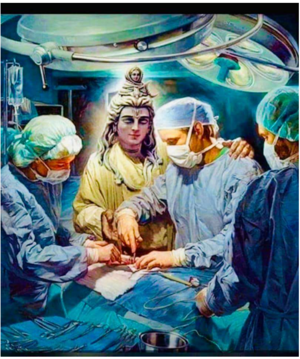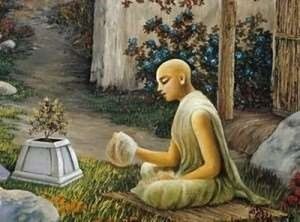Talk:Destruction of Kriyamāna Karm by Bhakti Yog
By Vishal Agarwal
The Kriyamāna Karm of a perfected Bhakti Yog practitioner bears no fruit, as it is performed solely as an offering to the Bhagavān.
Whatever you do, whatever you eat, whatever oblations you offer, whatever you give, and whatever austerities you perform, Son of Kunti, make it an offering to Me. Gita 9.27 You shall certainly be liberated from the bonds of karm, which produce good and evil fruit. With your mind disciplined by the yog of renunciation, you shall get liberated and will come to Me. Gita 9.28
The Bhagavān assures us that even an evil person who resolves to serve the Bhagavān, love Him, and worship Him goes to the Bhagavān because no sincere devotee ever perishes, and his account of evil actions is erased.
Even if a person of evil conduct worships Me with undivided devotion, he is to be regarded as righteous because he has indeed rightly resolved. Gita 9.30 Very soon does he become a virtuous ātmā and obtains everlasting peace. Son of Kunti, know it for certain that no devotee of Mine ever perishes. Gita 9.31
The Bhakta Yogī surrenders his entire being to the Bhagavān and it is His will that manifests through his actions. That Bhakta has become an agent of the Bhagavān and therefore his actions cannot lead to any fruit in this Saṃsāra.
Arjuna, the Bhagavān dwells within the region of the heart of all beings, causing them all beings to revolve by Māyā, as if mounted on a machine. Gita 18.61 Bhārata, seek refuge in Him alone with your whole being. By His grace, you shall obtain supreme peace and eternal abode. Gita 18.62
Therefore, a Bhakta Yogī should not worry and get rid himself of any anxiety about the mixed nature (tainted with pain, temporariness, etc.) of the fruit of his actions because he has surrendered himself completely to the Divine Will, and the Bhagavān Himself will ensure that his Bhakta is freed of all evil effects of his Karm.
Here from me further the supreme word, the most secret of all. You are surely loved by Me, and therefore I shall tell you what is good for you. Gita 18.64 Fix your mind on Me, be devoted to Me, worship Me, and make reverence (bow) to Me. In this way, you shall truly come to Me. I promise you because you are dear to Me. Gita 18.65 Abandoning all dharmas completely, take refuge in Me alone. I shall liberate you from all evils, do not grieve. Gita 18.66
Abandoning Dharmas does not mean that we forsake our duties etc. Rather, it means that we perform Pravṛtta Karm (deeds that lead to rebirth), and instead of placing our hope in the results of our Karm, we place hope only in the Supreme Bhagavān.
Haridās Thākur, the Muslim who would not give up his faith in Krishna
One of the most prominent disciples of Chaitanya was Haridās Thakur, who was born to Muslim parents in Budan, Jessore District (now in Bangladesh) in the year 1464 CE. His original Muslim name is not known or remembered. In the Gaudiya Vaishnava tradition, he is considered a dual incarnation of Bhagavān Brahmā and Bhakta Prahlāda. His father, Malai Kazi, was a Muslim magistrate – a high position in the Muslim Sultanate of Bengal. However, at a very young age, Haridās was influenced to become a devotee of Krishna by Advaita Acharya.
Initially, some conservative Hindus opposed his induction into the Hindu Vaishnava community, but his piety won over most of them over time. It is said that he would chant the name of Krishna 300,000 times every day. Impressed with his devotion, Chaitanya Mahaprabhu, whom Haridās accepted as his Guru, bestowed upon him the title ‘Nāmāchārya’ and deputed him to lead groups of chanters in Navadveep. Bengal in those times was ruled by a Muslim Sultan Hussain Shah. He was comfortable with servile Hindus serving in his administration, but would not tolerate public displays of Hinduism, even though Hindus formed a majority of his kingdom’s population.
Alarmed at the public chanting of Krishna’s names by masses, he perceived Haridas Thakur as a threat. Moreover, the fact that Haridas had committed apostasy from Islam was unacceptable. Hindus were imprisoned in large numbers to curb the revival of their faith. The Muslim governor of Bengal also got Haridas Thakur imprisoned. But taking this as an opportunity, Haridas started preaching the Vaishnava faith to the prisoners in the jails and declared that there was no difference between Hindu Dharm and Islam. This was intolerable to some Muslims, who viewed their faith as superior to all the others. As a result of his actions, a harsh sentence was pronounced on him by Gorai, the local Muslim magistrate – he was ordered to be whipped at the marketplaces of the city of Phulia.
Haridas was dragged and whipped from one place to another, Haridas did not resist, nor did he cease chanting the holy names of Krishna. At the 22nd marketplace, he was taken to be dead and thrown into the river. Miraculously, his body was washed ashore, and he was revived.
Soon thereafter, he followed Chaitanya Mahaprabhu to Puri, which was ruled by the Hindu king Prataparudra. Unfortunately, despite his sacrifices for the sake of his adopted Hindu faith, he was not allowed into the Jagannatha temple because he was born to Muslim parents. Chaitanya Mahaprabhu got a cottage constructed for Haridas Thakur in a garden from where he could see the Chakra (Asthra of Bhagavān Vishnu) on the spire of the temple. He asked Haridas to worship the Chakra from his cottage every day and assured him that he would get the same spiritual benefit that he would have gotten by seeing the Mūrti itself. Mahaprabhu also arranged for Prasāda (sanctified food) to be sent from the temple to Haridas every day.
When it was time for Haridas to leave his mortal body, he requested Chaitanya Mahaprabhu to place his foot on his chest to bless Haridas. Chaitanya Mahaprabhu complied, and thereafter, conducted the funeral of Haridas with his hand on the coast of Puri. The Samādhi of Haridas Thakur exists there even today. The life of Haridas Thakur illustrates how he chose to adopt Vaishnava Hinduism leading to severe repercussions but the power of his love for Krishna rendered all these tortures ineffective. Moreover, a great saint Chaitanya Mahaprabhu took charge of providing food to him and also blessed him at his death.
An example of an evil person who turned into a great Rishi is Vālmīki, who was a highway robber, but his devotion to Rama gave him the ability to author the immortal epic Rāmāyaṇa.


